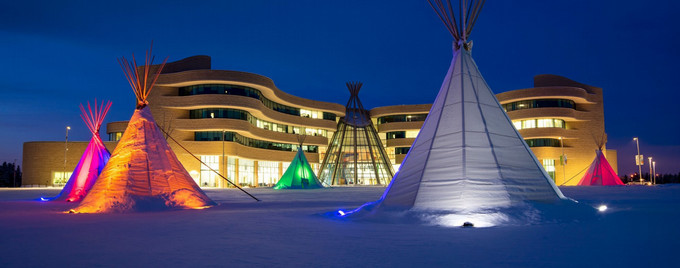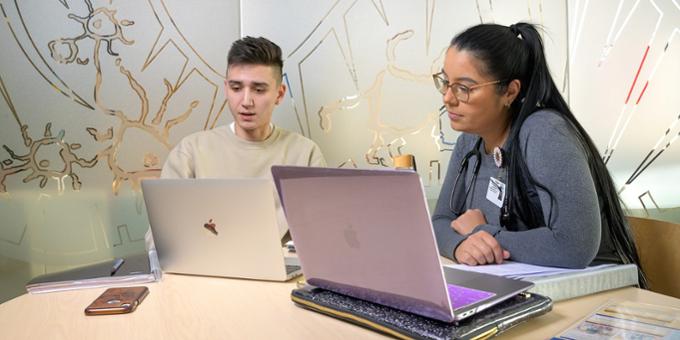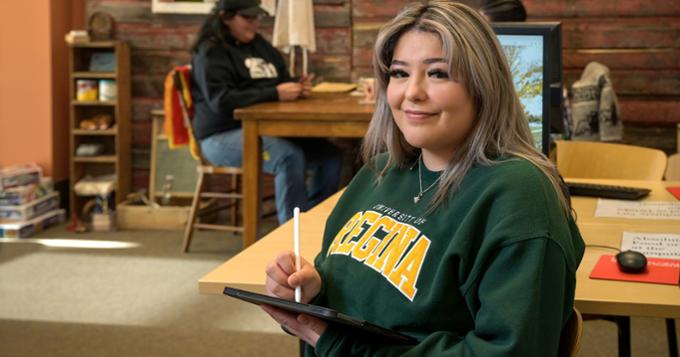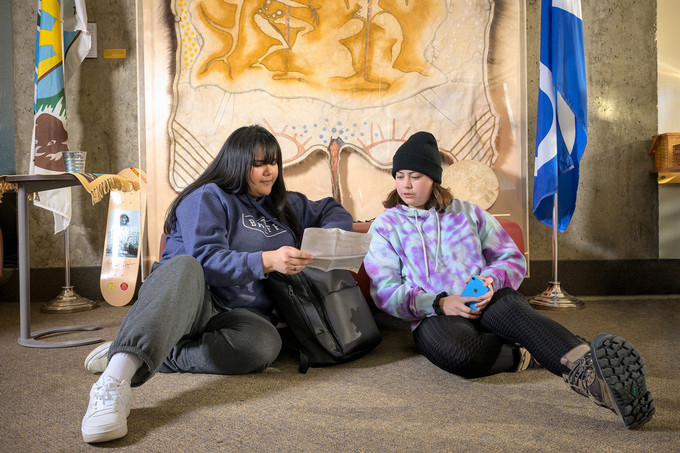
Truth and Reconciliation
Strengthen Connections With Our Past, Present, and Future
We are committed to reconciliation through teaching, research, learning, and service efforts across our campuses, and throughout the province. We aspire to walk together in a good way and strengthen our relationships which are based on mutual respect and accountability. This commitment will enhance learning and strengthen relationships by honouring the past, present, and future to create a new shared vision for the next generations.
Goal: Take significant action on the Truth and Reconciliation Commission’s (TRC) Calls to Action relevant to post-secondary education.2
2 14 Calls to Action were identified by the U of R Reconciliation Action Committee in their Truth and Reconciliation Commission Working Group Guide: #14, 16, 24, 43, 44, 57, 62, 63, 65, 66, 67, 70, 86, 87
The University of Regina’s commitment to Truth and Reconciliation is the second of five interconnected focus areas in our 2020-2025 Strategic Plan.
Over the past decade, the University of Regina has made significant strides in increasing the number of students self-declaring as Indigenous. This progress is a testament to our commitment to diversity and inclusivity, with Indigenous students now making up 15.3 percent of the University’s student population.
Institutional changes at the University—while still ongoing—have made the campus more attractive to Indigenous students. This includes initiatives such as the ta-tawâw Student Centre, nitôncipâmin omâ Student Success Program (The OMA Program), Indigenous Social Work and Education programs, the Indigenous Advisory Circle, among others. In June 2021, the University welcomed our first Associate Vice-President (Indigenous Engagement).
Our commitment to reconciliation is unwavering. We are dedicated to integrating this principle into every aspect of our institution, from teaching and research to learning and service efforts. This commitment is not just a promise but a path to a better future, one built on mutual respect and accountability. By honouring the past, present, and future, we create a new shared vision for the next generations.
Improve Supports for Indigenous Students, Faculty, and Staff
First Nations, Inuit, and Métis communities have unique needs, including access to Elders and knowledge keepers, as well as community supports and mentorship programs. Ensuring these communities have strong relationships with one another, and with the University of Regina as a whole, is crucial to our shared success.
Objective Goals
- Increase Indigenous faculty, representative leadership, and workforce
- Develop and implement general principles for engagement with Indigenous individuals and communities
- Commit to stable and diverse presence of Elders and knowledge keepers
- Support and encourage opportunities for respectful ceremonial participation for all learners
- Create opportunities and enhance student success by increasing availability of academic and student supports that are relevant, culturally affirming, and innovative
- Create opportunities for all learners to learn and engage with Indigenous ways of knowing and being

Provide Educational Opportunities and Experiences Across Saskatchewan
Connections to communities outside of the City of Regina are crucial to our commitment as a provincial university. Many Indigenous communities are in northern and remote areas of the province, and students should not need to travel and relocate to urban areas. We will continue our expansion of community-based partnerships committed to education, ensuring all residents of Saskatchewan can access high-quality education.
Objective Goals
- Commit to continued and expanded Indigenous community connections to build relationships and collaboratively, strategically, and intentionally work together for the best interest of Indigenous students and their communities
- Continue to build and strengthen relationships with Indigenous communities that facilitate accountable education and research
- Increase number of collaborative projects with tribal councils, Reconciliation coalitions, governments, and Indigenous communities to align education and research-based need with the University of Regina, provincially and nationally
- Evaluate distance and distributed learning opportunities and technologies to enhance flexible learning options for students
- Build and strengthen relationships with First Nations University of Canada, Gabriel Dumont Institute, Saskatchewan Indian Institute of Technologies, satellite campuses, and regional colleges

Incorporate Indigenous Ways of Knowing Into Teaching and Research
Our relationships with Indigenous peoples and communities are integral to our identity and sense of social purpose at the University of Regina. By integrating Indigenous ways of knowing into our scholarly activities, and cultivating a community of reciprocity, we continue to reconcile our past and work towards a stronger future together.
Objective Goals
- Continue implementing and responding to the University of Regina’s “Statement of Commitment in Response to the Truth and Reconciliation Commission (TRC).” The goals outlined in the “Guide to TRC’s Calls to Action at the University of Regina” specify that students, staff, and faculty have:
- a knowledge of treaties
- an understanding of Canada’s history
- an awareness of Indigenous ways of knowing
- knowledge of the TRC’s Final Report, the Royal Commission on Aboriginal Peoples and the UN Declaration of the Rights of Indigenous Peoples
- An understanding of the role they can play in reconciliation.
- Provide support and training for respectful and meaningful integration of Indigenous ways of knowing into courses and community outreach activities
- Build and strengthen our relationships with urban, rural, and remote Indigenous communities with the aim of accountable and reciprocal research
- Enhance Indigenous engagement in the research enterprise
- Students, faculty, and staff complete the Four Seasons of Reconciliation program
- Enhance professional development opportunities and support for units and faculties to learn to Indigenize and decolonize pedagogy, curricula, policies, procedures, and processes
